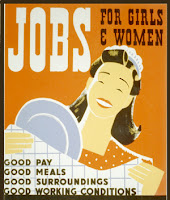 I’m back. Thank you for all your warm wishes and kind thoughts yesterday. I was very touched and moved.
I’m back. Thank you for all your warm wishes and kind thoughts yesterday. I was very touched and moved.
My belated grandmother was the director of a nursery school for 20 years. My other grandma (the grey haired one below, who turns 90 next week) was a head nurse who later worked at a Planned Parenthood-like clinic. I’ve always felt proud to have had what I’ve thought of as rather high-powered grandmothers. So last night at The New School-sponsored panel on Working Moms (with work/life all-stars Joan Williams, Linda Hirshman, Ellen Bravo, EJ Graff, Heather Boushey, Pam Stone), sitting in a row flanked by “next generation” feminists Jen Pozner, Kara Jesella, and Lisa Jervis, I had generations of women in mind. It seems so frustrating that after 40 years, as Ellen Bravo reminded us, we’re still waiting for families–or rather, the rigidly gendered dynamics of families–to change.
Is the solution to work/life conflict personal or is it political? This was one throughline of the discussion last night, with Williams and Bravo (and Stone) angling heavily for the structural, and Hirshman making a case for both. Another important throughline was class. And despite my fixation on the contemporary travels of the ole slogan (“The Personal Is Political”–which I write about a ton in Sisterhood, Interrupted) and my utter frustration that the popular convo remains narrowly focused on “trends” among the elite, my favorite part of the conversation was an extended digression on men. Why aren’t they involved in the work/life conversation? Why does it always have to be about women? Why did I just write “digression” instead of “centerpiece”? Because there’s a “frigid climate for fathers” at work, says Joan Williams. Men will pursue these roles when they stop being punished for it in the workplace. And maybe that’s when we’ll all start putting men at the center of the conversation, too. Chicken, egg? Or rather, chicken, sperm.
In any event, instead of summarizing, I thought I’d just share some memorable quips. Because these ladies all have a knack for rhetorical flair, I leave it in their words (and forgive me or correct me if I’ve mangled anything!):
Linda Hirshman defending the methodology behind her feisty, controversial book, Get to Work: “I am not Lisa Belkin. I didn’t decide there was an opt-out revolution and then go looking for the revolutionaries. I didn’t just call up my friends. And I didn’t expect to find what I found.”
Linda Hirshman on why it’s personal: “We can’t run away from the unjust family by focusing solely on the unjust workplace.”
Joan Williams on why it’s structural: “I think we’ve been waiting for 40 years for families to change. If we keep waiting, women will lose.”
Heather Boushey on the popularity of the opt-out narrative: “The media likes the women-are-heading-home story because it solves all our social policy problems–problems like family leave, child care, sick leave….The state continues to act as if all workers have a stay-at-home spouse to take care of the sicks, the sick, the elders.”
Heather Boushey on framing: “When men lose their jobs, we call it a recession. When women lose thir jobs, we say they wanted to go home and hang out with the kids.”
EJ Graff on “choice” rhetoric: “If women are getting pushed out of the workplace, why do they tell journalists ‘I chose to stay at home’? Because, as psychologists say, we want to want what we’ve got. It gives us a sense of control that we may not actually have.”
Ellen Bravo on, well, everything: “Family values generally stop at the workplace door.” “Sons and brothers would be better husbands and fathers if they did not get punished for it at work.” “We don’t want to smash glass ceilings. We want to redesign the building from the bottom up so that one doesn’t have to have a wife at home in order to succeed.”
And while I’m at it, did you know…
…that the U.S. has a steeper part-time penalty than many other countries? Part-time workers here earn 21% less/hour–and don’t have benefits. That’s 7 times less than part-timers in Sweden. I’m packing my bags. Who’s joining me?
(Photo cred)
 Last night I went to my 20th high school reunion. It was kind of like walking into a fun house where you recognize the core, but everything is distorted. Must be how I looked to others, I’m sure, too.
Last night I went to my 20th high school reunion. It was kind of like walking into a fun house where you recognize the core, but everything is distorted. Must be how I looked to others, I’m sure, too. 







